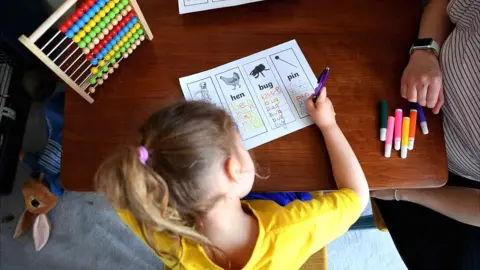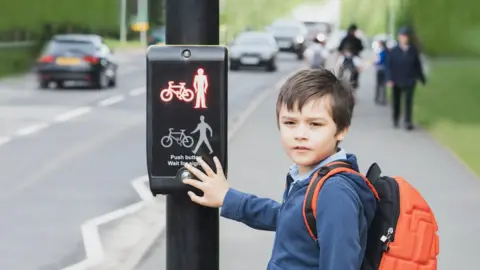NI education: What do radical cuts mean for schools?
 Getty Images
Getty ImagesSchools are far too good at disguising their problems.
Go into the vast majority of schools and you will enter a warm and welcoming place.
Brightly lit classrooms, well-taught children, artwork on the walls, trophy cabinets, old and new photos of smiling staff and pupils.
In some ways that is necessary.
Pupils, for instance, do not need to know that their school is sliding further into deficit.
But those disguises mean that the real financial problems faced by education are easy to overlook.
It is different to the - also financially stretched - health service, where there is a tangible reality to lengthening waiting lists, cancelled operations or long waits for surgery.
Many schools, to an extent, have never had as much money as they felt they needed to deliver what they wanted.
But what makes 2023 different is that the Department of Education (DE) and the Education Authority (EA) are now having to make radical and swingeing savings.
 Getty Images
Getty ImagesThe 2023-24 budget for education, which at about £2.5bn is Stormont's biggest behind health, was reduced by about £70m or 2.5% - but the real-terms reduction is much larger.
The department has said that there is a £300m gap between what is needed to run the education system and what it has.
And that has led to so many cuts over the last few months that it is hard to keep track.
But bear with me while I try to list them.
- First, the school holiday food grant - or "holiday hunger" payment - for children entitled to free school meals was cut.
- Then primary school counselling funding went, and money for the Engage programme which enabled many schools to employ extra staff to help pupils struggling after the pandemic.
- Money for new school buildings, shared education, special educational needs coordinators, a new IT system to allow all schools to move to cashless payments, specialist nurture classes in 62 primaries - all gone or reduced.
- Then there has been the end of funding for soccer and GAA sports coaches or the Young Enterprise charity which helps young people learn business skills.
- The department is also saving about £75,000 as it has stopped funding a scheme to provide every baby with a free book or two.
- The EA, meanwhile, has told schools that they will not be recruiting any new crossing patrol staff anytime soon, among other savings measures.
- The Department for Infrastructure has cut funding for cycling proficiency in schools and even free road-safety calendars for classes.
 Getty Images
Getty ImagesMeanwhile, schools are on standstill funding for pupils despite rising costs.
That is despite many facing increasing demands due to the impact of pandemic restrictions on children's development and mental health, and the money struggles some pupils' families are facing.
Forgive me if I have missed anything above; I am sure I have.
I also have not even begun to consider the possible impact of reductions in funding for further and higher education from the Department for the Economy.
A list, though, does not gave any real idea of the full effect of each cut.
For example, what is the impact on struggling families of losing £27 per child per fortnight? That is the money they will now not receive over the summer holidays to help them pay for food when a child is not receiving a free school meal.
There is no doubt that there could be some reform of the education system.
One consequence of that would presumably be some savings.
However, I have never known there to be unanimous agreement on what reforms should be a priority.
An independent review of Northern Ireland's education system was agreed in the New Decade New Approach (NDNA) deal.
That has been going on for a couple of years now, but is presumably on ice until a Stormont Executive appears again.
But let's face it, we have quite a history of reviews in Northern Ireland which have led to limited action.
The fear is that there are more cuts to education to come in the near future.
